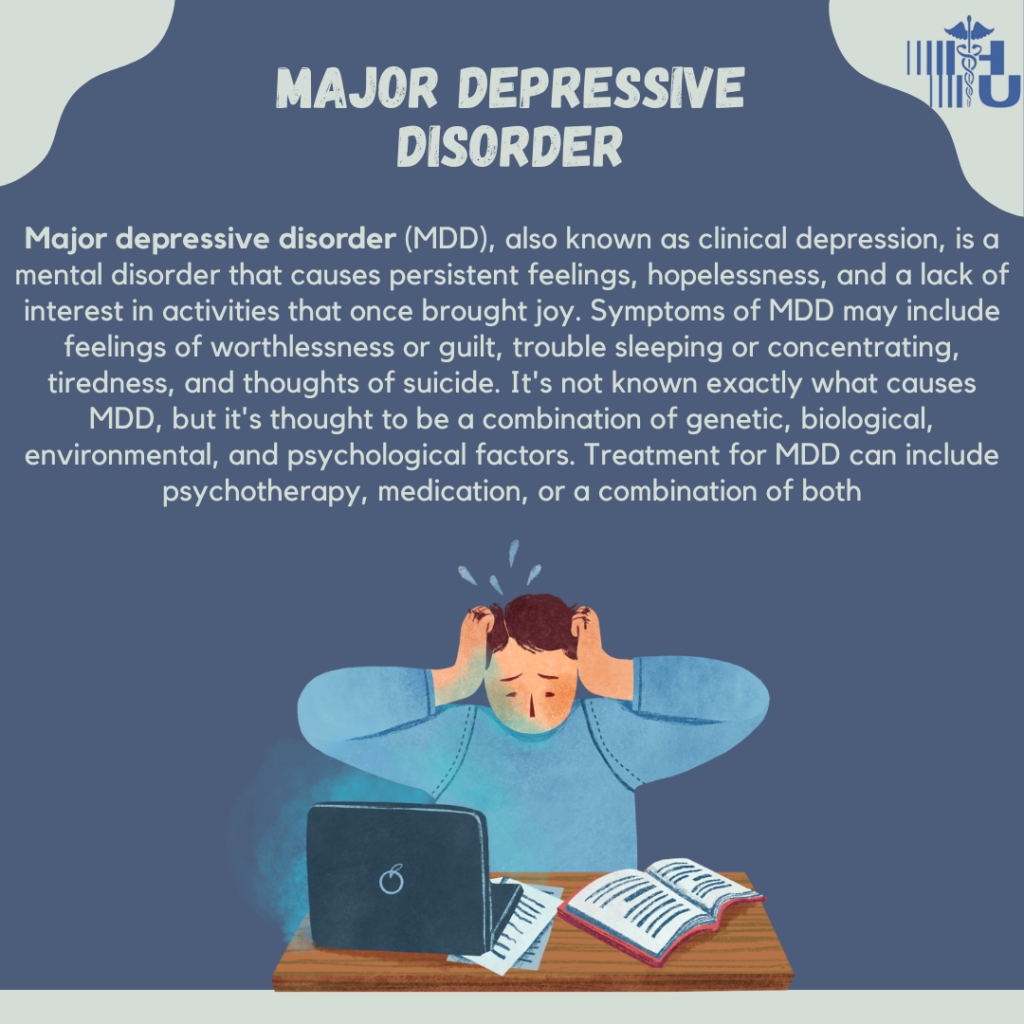Published on: April 3, 2023

Major depressive disorder commonly referred to as depression, is a serious and common mental health condition that affects millions of people globally. It is a mood disorder characterized by persistent sadness, hopelessness, and a lack of interest or pleasure in activities that were once enjoyable.
Depression can be caused by various factors, including genetics, life experiences, and brain chemistry. Those with a family history of depression, traumatic life events, or chronic illnesses are at an increased risk of developing depression.
MDD Means Major Depressive Disorder, a mental health condition characterized by persistent feelings of sadness, hopelessness, and loss of interest.

Major depressive disorder with psychotic features is a subtype of depression that involves experiencing hallucinations or delusions. These symptoms can include hearing voices, seeing things that are not there, or having beliefs that are not based on reality. This type of depression is more severe than typical depression and requires specialized treatment. It can be caused by various factors, including genetics, brain chemistry, and life experiences.
Treatment may include a combination of medication and therapy to manage symptoms and improve the overall quality of life. It is essential to seek professional help if you or a loved one is experiencing symptoms of major depressive disorder with psychotic features.
In Major Depressive Disorder with Anxious Distress, people have both depressive symptoms (like feeling sad or hopeless) and anxiety symptoms (like restlessness, difficulty concentrating, and feeling tense). This type of depression is more challenging to treat than typical depression, as it may require a combination of medication and therapy that explicitly targets anxiety symptoms. It can be caused by various factors, including genetics, brain chemistry, and life experiences.
Risk factors for Major Depressive Disorder with Anxious Distress include a family history of depression or anxiety disorders, substance abuse, and stressful life events. Seeking professional help is crucial if you or a loved one is experiencing symptoms of Major Depressive Disorder with Anxious Distress. Effective treatment can help manage symptoms and improve the overall quality of life.
Major Depressive Disorder can be classified as either a single or recurrent episode. A single episode of MDD is characterized by the presence of the symptoms described above for two weeks or more. During this time, the symptoms must be severe enough to cause significant impairment in daily functioning. Treatment for MDD single episode typically includes psychotherapy, medication, or a combination of the two.
Recurrent episodes of MDD are characterized by multiple episodes of depression that occur for two years or more. Treatment for recurrent episodes of MDD is similar to treatment for single-episode MDD but may also include strategies to prevent future episodes.
Major Depressive Disorder (MDD) and depression are terms used interchangeably, but they are not necessarily the same. Depression is a broad term that describes a range of mood disorders that can cause feelings of sadness, hopelessness, and loss of interest in activities. MDD is a specific type of depression that is characterized by the presence of certain symptoms for a specified period of time.
The diagnostic criteria for MDD include experiencing at least five of the following symptoms for at least two weeks: low mood, loss of interest in activities, changes in appetite or weight, changes in sleep patterns, fatigue, feelings of worthlessness or guilt, difficulty concentrating, and thoughts of death or suicide.
While depression can refer to a range of mood disorders, MDD is a specific diagnosis that requires meeting certain criteria. Additionally, MDD is typically more severe than other types of depression and may require more intensive treatment.
It’s important to note that depression and MDD are serious conditions that require professional treatment. If you are experiencing symptoms of depression or MDD, it’s important to speak with a healthcare provider to get the help you need.
For more information about Mental Health Conditions. Visit our Mental Health Library page. To understand and cope with your Major Depressive Disorder, get help from our Top 10 Psychiatrists, Psychologists, and Therapists who are known for providing the best mental health treatment and psychiatry services. To book an appointment please call us at (800) 457-4573 or submit an appointment request.
Discover the essence of Harmony United Psychiatric Care through our impactful numbers. Our experienced team is dedicated to fostering mental well-being.
10
+
Years of Experience
With 10 years of unwavering commitment to mental health, we bring a wealth of experience to support our patients on their journey.
About Us58
+
Providers
Our dedicated team comprises 58 skilled therapists', psychiatrists', psychologists', ensuring personalized and expert care for each individual.
Providers13
+
Locations
Across multiple locations, we extend our reach to provide accessible mental health care tailored to diverse communities.
Locations70000
+
Patients Served
Over 70000 patients have entrusted us with their mental well-being, experiencing compassionate care and positive outcomes.
Book AppointmentWelcome to the latest edition of “Discover Harmony,” the newsletter from Harmony United Psychiatric Care! In this edition, we bring you insights, updates, and valuable information to support your mental well-being journey.
Subscribe to newsletter